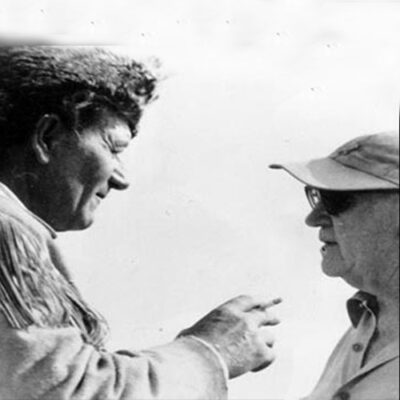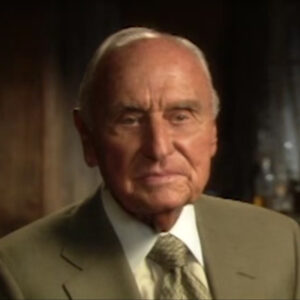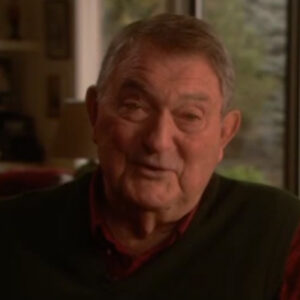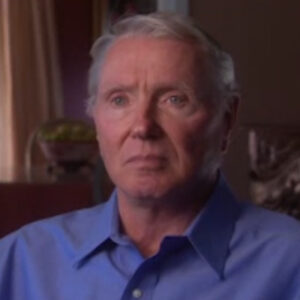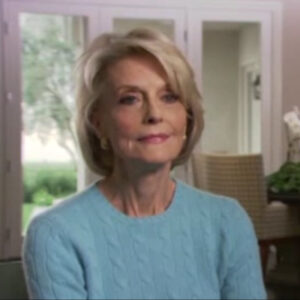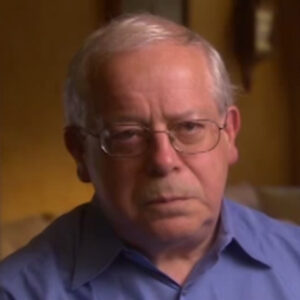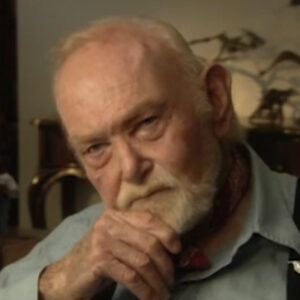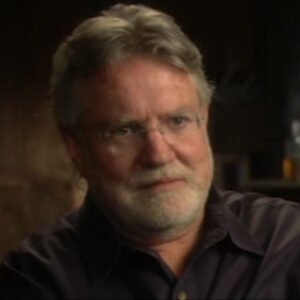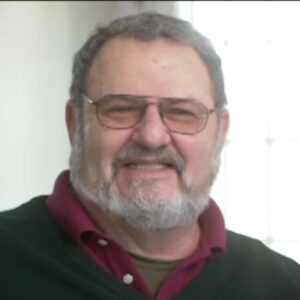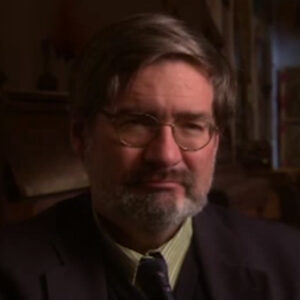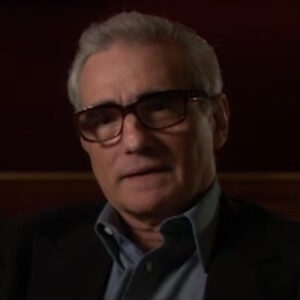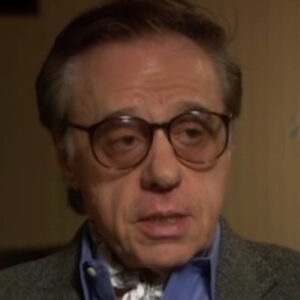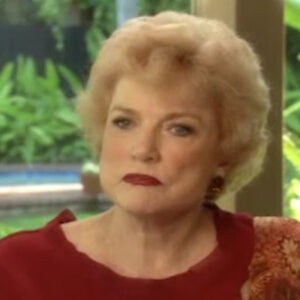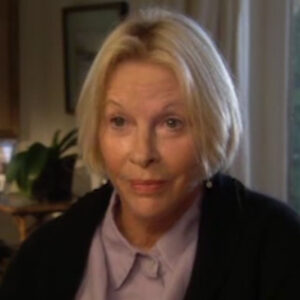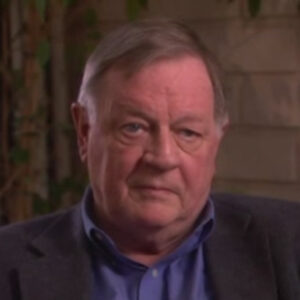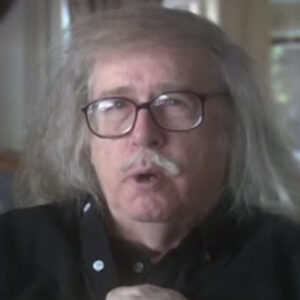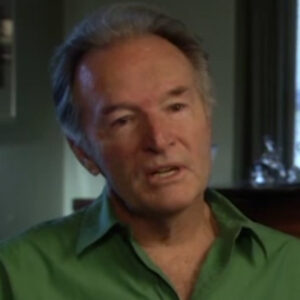Speaker Directing John Wayne in the Cowboys, what was he like by that stage in his career?
Speaker And it’s very interesting to evaluate what Wayne was like when I approached him to do the Cowboys.
Speaker You know, I didn’t want him. I had prejudice against him because of a certain political stance that he had taken in the past.
Speaker And, you know, he was a very right wing conservative and and he was responsible in a major portion for the blacklist of the 50s.
Speaker You know, he was a real supporter of those. And I was we were at opposite ends of the spectrum politically. And I went to Warner Brothers. I was trying to get George Scott. I had the property of me and they asked me if I would submit it to Wayne, if I would submit it to Wayne.
Speaker And I thought, oh, my God, I want a lot of compromise for me that all my political thinking I have to work with John Wayne, you know, this why assumed was a bigot and then he had a reputation for swallowing direct this whole.
Speaker But we John Kelly and I flew down to Mexico where he was shooting a picture.
Speaker He read. We sent the material to him and he. He just went crazy, said, I’ll do anything to be in this thing, so I had to go see him. It’s a big giant hands like a ham and terrific and very friendly and warm. And he wanted to know what he could do to convince me that he would be great in this picture. I was stunned because I was, you know, 30 or something like that. And he was a giant, you know, but he convinced me that it would be great to have him in the picture.
Speaker And it turned out, you know, all my prejudice about his bigotry. I said to him, let’s never talk about anything but the picture. And I surrounded him with with a crew. I wouldn’t let any of his any of his crew, his normal crew or his normal cast. Me and I surround them with a lot of hippies, pot smoking crew members who, you know, I didn’t want them to be comfortable. I wouldn’t let them. Where is all this normal clothes that he usually wore? You know, I insisted he wears, you know, individual clothes, brand new. I even hired a blacklisted actress to play his wife without his knowing it because it was one of its employees. Oh, yeah. I’m sorry.
Speaker That’s going to happen from time to time for this interview.
Speaker So I thought I better make this more brief and I’ll try to look at work later. OK, OK, so the point is, I had a great time with that, with John Wayne who fooled me, you know, because he was a gentleman, he was friendly, he was great with the kids who were around him. They were climbed on him like a monkey bar at a playground, and he always had time for everybody.
Speaker What was he like? As you know, as you said, he was he had a reputation for being difficult with directors who were hawks of for, you know, Hathaway. How was he working with you?
Speaker When I went to I’ll tell you a quick story. I’ll try and make it brief. There was a shot I shot in the picture where the the kids and after he’s hired a bunch of kids to do is his his cattle drive because he’s lost his hands to a gold rush. So he had to hire children from a school, as you probably know. And he trained them. And there was a scene where they all had to leave with 1500 head of cattle and start this cattle drive, 1500 head of cattle, one hundred horses, ten kids, ten stunt kids off on the side, parents, everybody, you know, everybody is there. And I’m up on a crane. We’re shooting with five cameras and I’m up on a crane in the front. And Roscoe’s there with a with a six up. And Wayne is supposed to come over. You’re ready, Mr. Nightlong.
Speaker And he says, Ready when you are. And they go, all right, you move them out. You know, that’s the beginning.
Speaker So I’m getting ready and I’m sitting up on the crane and I haven’t even turned the camera yet. But he thought everybody was ready. So he goes he starts when the camera’s not rolling. Nothing. And he just comes comes down. He starts to do it. I a well, without thinking that I was talking to a giant, I said, don’t you ever do that.
Speaker I’ll tell you when we start. I’m the director. Go back to where you I’ll let you know when the cameras are rolling.
Speaker And as I’m saying it, I’m going, oh my God, what have I done, what have I done? You know, tomorrow I’ll be gone.
Speaker And the McGlocklin I’ll be down here, one of his old cronies to direct the picture. And so we made the shot was great.
Speaker You know, everything worked fine.
Speaker And he was the end of the day and he got put his his hat, you know, he goes to his car, which was which was a car with a raised cabin so that it would fit his head in one, take his hat off because he was bald.
Speaker You know, he didn’t want anybody to know he was born.
Speaker And he goes off to Santa Fe, you know, and it’s the end of the day. And the crane comes down and the crew, one by one comes over to me and shakes my head as if to say goodbye, you know, because I had really been I had lost my mind control. And I really I yelled and yelled at John when I was up on a crane. So it was safe, but it really wasn’t safe. So we all drove back to town waiting for the axe to fall.
Speaker And there were four calls from him. I finally got screwed up my courage, and I called him, we want to have dinner with me, I thought, well, there it is, you know, he’s going to tax me and we go to dinner, which was like going to dinner.
Speaker I mean, I’m walking in with Abe Lincoln or something. You walk into a restaurant with John Wayne. The place went berserk. And we had dinner and had a few drinks. And then he went to I was waiting to be fired and he went to the bathroom and he came back. I won’t be able to stand up and I’ll tell you, I’ll do it as if as if I’m standing up, he said and walks back and his pants are all wet.
Speaker So he went, I said, what happened? He says, It always happens to me, I’m standing there and someone turns to me and says, John Wayne, he was friendly, he was warm.
Speaker He never turned any autograph seeker away.
Speaker And from that day on, he called me sir because he loved being told off when he knew he was wrong.
Speaker And he said, you remind me of Ford in that respect, that I don’t assume that I’m as good as Ford and visuals. But he loved being told off, you know, and I and I did it without hesitation. I thought I was going to be killed. And it turned out that he loved that and called me sir for the rest of the picture. Yes, sir. Mr. Right. Oh, yes, sir.
Speaker Good. Yeah.
Speaker The picture I saw of you and for the way, how did that come about, how you jumped for this thing and said no, I guess when I asked him, they came down, it was, you know, stunning it to be directing a big Western and have John Ford as your guest on the set. You know, I was nervous and anxious about the about him, but he was he was also very warm. But he was a tough old bird. You know, Ford was really tough.
Speaker He said, kid, you’re doing good, you know.
Speaker And I was a kid and, you know.
Speaker Unfortunately, I’m not now, but it was a real honor, you know, when when that picture came in, the press of me and Wayne and Ford in the car, I was standing outside and with a heading saying a caption saying past, present and future.
Speaker I was genuinely honored. You know, it was great. It was great.
Speaker However, you think, oh, a few hours, you know, if you watch me shoot and all that. And it was, you know, maybe you’re anxious, but I felt good about what I was doing. So it was all right. And he kind of patted me on the head and all that kind of treatment. He was a tough bird.
Speaker You know what I was? I was a relationship between him and Wayne. Wayne was his devoted slave.
Speaker Wayne just adored him and, you know, was like a father to him, a tough father, which is what he liked to have, as opposed to most people who who think that he he was I mean, he’s brutal.
Speaker He was brutal with people who were weak.
Speaker But if you stood up and stood and stood for what you believe, then he was great. I’m telling you, I I learned a lot about prejudice from John Wayne because I was very prejudiced against him and I found him, though I disagreed with everything he stood for politically. And in a lot of ways, he was a decent guy. He was friendly. He was warm. So it taught me a lesson, an important lesson in my life that not to judge hastily, he was a terrific guy and friendly and warm and gracious.
Speaker And I never had a problem with him. And but he represented everything that I hated.
Speaker Did he ever tell you stories about him in four days and I wish I had more stories to tell you about, because this is I know about about Ford’s relationship to women. I know that Ford he told me how Ford treated him like he was an amateur.
Speaker Ford, you know, made them go back to his trailer. You know, he really handled them like he was a recalcitrant child. But I don’t I can’t remember the details. Forgive me.
Speaker You know, I also like to direct the episode of Gunsmoke, and he has 60, 40, 60, said, my God, you’ve done your research and growing up watching the Westerns, what was the impact of watching the stagecoach and for the passage of it?
Speaker Well, you know, I was so intimidated when I was finally hired to do some Gunsmoke, you know, and I was the beginning in my career in television because the closest I’d been to a horse was to a theater cop in New York. You know, I never ridden only once I had ridden with Steve McQueen and and, you know, wanted dead or alive. And Steve and I went to school together and he trained me to ride to get through this this episode of Wanted Dead or Alive when he was on it.
Speaker But.
Speaker I’ve got the question and the impact of a yet all of you see when I when I when I got hired to do Gunsmoke, I thought I’d better bone up.
Speaker So, of course, I looked at everything that Ford had done.
Speaker And I thought, oh, my God, how does anybody even approach the brilliance with which he staged those? First, we would find the perfect shot all the time, the perfect shot, and then he would stage everybody to the camera. You know, it was not like it is nowadays when when the camera, you know, he’s got four if you got four cameras going all the time with long lenses and and hand-held has become handheld cameras, which, of course, move and give a kind of a my mind this artificial sense of reality. But those all of it was his his work was very dignified and classic and perfect. And he moved his actors to the camera as opposed to moving the camera to follow his actors, although he did that as well. It just was it’s a lesson to see any of his films because he was a master and there was nobody even questioned his mastery. So I watched all those films that you’re talking about and thought, how am I ever going to do this? And of course, I did the gunsmoke like you do Gunsmoke. I never did him like he did.
Speaker So I said for a considered one of the greatest American directors to stand by the camera. What is it that has made him live on this?
Speaker You know, on the same level as you know, it’s interesting that you ask what what what made him is as a significant a director as he was.
Speaker First of all, I guess the first thing that you have to think of is he had a kind of understanding, a humanitarian understanding of actors and relationships that you rarely see anymore in the in the modern films, which are all action packed and full of explosions.
Speaker And he didn’t depend on that. He depended on the human conflicts that were involved and his eye, his eye for composition.
Speaker He’s creating, you know, when Monument Valley, all of those incredible, incredible pictures that he made.
Speaker And I mean I mean, there were any any way any of them could be made as a still that would be happily ensconced on somebody’s wall. Brilliant that he had understanding of light as well. He used to shoot at certain times.
Speaker That light was actually reminded me of David Lean, who who would wait for hours for the right light and everybody would sit around, you know, and when the light was right, he would shoot because he knew how important the beauty he had a sense of the beauty of the West, the magnificence of the West, the heroism of the West. And Wayne, when he found Wayne was a perfect icon for for his his is mature as a as a director and growing up as a young man.
Speaker You saw one of those early movie about how did we come off to you, those early with and then you get to him on the Cowboys.
Speaker All was waiting like for you growing up and you watched the way where, you know, a giant, a hero, you know, it just amazing, solid.
Speaker Even as a young man, he had a kind of certainty about him that, you know, like Gary Cooper, they would you know, the all they needed to say was yes or no. And you you see, he didn’t they didn’t have to prove anything. They were stood there as as masculine icons, as amazing heroic figures.
Speaker And so I was so intimidated by working with Wayne because when he was I must have been in his 70s when I started to work with him. And by the way, he would never let a stuntman to his stuff. He’s a guy who had one lung. And I had very difficult shots of full out riding amidst hurting horses. He did all that stuff. You know, there was nobody who substituted for him except in the corral when he had a fight with horses. You know, he just couldn’t do that. But he would insist, Wayne, you know, he was he was a macho man and relaxed about it. You know, you didn’t he didn’t have to prove anything, at least not to me.
Speaker You interviewed him a couple of weeks ago. We were having a kind of tolerance and he was talking about how she did a couple of things. He was doing some scenes in the horse soldiers and I thought manipulated performance out of her. You know, he had a technique he had all the time directors sometimes really bully their actors into getting performance as a director and as an actor. What do you think of the way those old time directors used to elicit performances from actors?
Speaker Well, you know, I have a great respect for actors.
Speaker I’ve been a member of the Actor’s Studio for too long to even mention since and the 50s I became a member of the Actor’s Studio.
Speaker And I’ve been in the tradition of of my training is in the tradition of the group theatre, and I had the best of teachers, I had the greatest teachers, I had Sandy Meisner and Lee Strasberg and Kazan. I was worked with him for a while.
Speaker And Bobby Lewis, all the great teachers were were I was a beneficiary of their labors. I’m I approach acting differently.
Speaker I, I consider that the act, the creation of behavior, genuine behavior is a real skill that I and I respect actors very highly because they have a they have a difficult task. They have to denude themselves in public and make themselves available to response to other characters, to situations, and they have to expose their feelings. So I nurture that as opposed to dictate I’m not a dictatorial director with actors. I prefer to nurture them into surprising performances of their own. And I think that I I guess I’ve done it well for a long time and I feel very proud of my my work with actors. And I have my actors have had something like 28 Academy Award nominations and my pictures, and I feel very prideful of that. And it’s not old fashioned way, like, I guess the manipulating that that the board did. Kazan did it, too. I watched Kazan manipulate actors. When you walked into Kazan to sit down and talk to him, he made you feel like his day didn’t begin till you got there. No matter what was really going on with him, he would listen to you like this. You know, he would he would be you saying, why can’t he really cares about me? He really wants to know what I think. I think those old time guys like Ford, who was so brilliant, did it a different way, as Carlitos undoubtedly told you, that he manipulated them into tricked them into performances. Kazan did that as well. I’ve seen him do it.
Speaker Do you think it’s because of the lack of being had, the techniques?
Speaker Well, the things that I think that directors now more psychologically aware, or at least some of them are, and as a result, they cast differently. They they they’re able to to nurture performances in a different way by pushing psychological buttons. And I think that’s a skill.
Speaker Before we start the interview, you were talking about how the business has changed, right? Business has changed. I want to take you back.
Speaker Oh, by the time he came to you to see you guys on the Cowboys, he was pretty much out of business. Yes, he was. How did a guy like Ford as a director survive so long in a business that for him, by the time he got his head changed so much? I think he is absolutely right to survive.
Speaker This is like how it survives and it’s hard to survive. Let me tell you, first of all, ageism gets you.
Speaker Everybody seems desperate to to hire the youngest possible person who’s done a couple of music videos or something as flashy and they forget the or is my my my opinion that they have forgotten the storytelling, the real skill. I feel that I am a storyteller and that technique should support storytelling. Ford was like that.
Speaker He didn’t. He he is his movies were not tricky. They were honest and they were beautiful and they were solid and they were American and they were male and they were somehow so perceptive without emphasizing that aspect of life.
Speaker On the other hand, I think that things have happened. I wonder you ask in a sense, how did Ford survive? He was excellent. He was way better than everybody else. And, you know, when you see excellence, there’s no you can’t hide from it. You say, my God, that’s fantastic. Well, he was always excellent. Isn’t that finally what separates the men from the boys? You know, styles change, but real excellence dominates. You can recognize it any time when you see something really brilliant, you go, oh, my God.
Speaker Well, that’s generally speaking, are directors working with with a writer and with and with with a brilliant actor and with a wonderful camera crew.
Speaker You know, it’s something the director was kind of like a benevolent despot. You know, he’s trying he’s a dictator. He he does it with affection. And at least I try to do it with affection and with respect and love.
Speaker But it’s it’s a big responsibility because you’re the guy who I feel like a director is like a guy with a high powered rifle, with a telescopic sight who’s aiming at a target a quarter of a mile away. That’s that big.
Speaker And he has one shot and he’s got to get everybody to want to go to that one place and make them want to go, not be forced to go, but engage them, get them involved so that they want to hit that spot or else you’ll never hit the target. A producer is a guy with two shotguns.
Speaker He throws a million things in the air and he shoots and hopes one of them comes down for Ford knew how to get there to get to that side.
Speaker That’s that’s right. He sure did. Or he had a vision. He was clear. He was absolutely clear.
Speaker But he also I guess you’re saying Hollywood changed by nineteen sixty four who had been on the contract to Fox and his own independent company age.
Speaker The system was changing. You know, we knew that he was right.
Speaker And he said, you interviewed Andy. Well, I just mentioned. Oh, my God. Oh, my God.
Speaker So he said we was with, you know, one point with Ford when you mention his name was like, oh, yes, of course. You get your picture made, you can get Ford.
Speaker And then it was the love of my life, life I’m beginning to tarnish.
Speaker How politically savvy does a director have to be?
Speaker Someone like Ford, someone like you? I mean, you got, you know, this stuff about talent survive in this business.
Speaker And it’s it’s a tricky situation. You know, you try not to manipulate and be devious and but you try to be true to your work. I’ve ever since I was a child, I wanted to be not just a director, but an artist. And I don’t mean to be arrogant, but that’s another level of aspiration.
Speaker You know, you’re you’re only as good as as far as your horizons, how far you can see.
Speaker And I was fortunate very early in my life to have people who who exposed me to the finest targets in life, the higher targets. And I’ve been dedicated to that all my life. It’s cost me a lot because there’s a lot of people who are only interested in how many dollars can be earned by this moment or this picture or this material.
Speaker They’re not really interested in the same things that I’m interested in, and I think that’s become characteristic of the change. In Hollywood, nowadays, the bottom line thinking has has taken away a lot of the humanitarian or humanistic aspects of art, and that’s disillusioning. And as I may have mentioned to a number of people, I think that there’s a sense of the culture disintegrating, that the values have changed so much and in direct proportion to the way to dealing with the dollar.
Speaker The the sensitivity and the ethical and morality of our nation is is slipping away.
Speaker And I’m concerned about it. And I want to I want to fight it. And I want to make pictures that that that celebrate human beings and celebrate what what’s what we’re capable of because we’re capable of a lot.
Speaker You know, for the way in the 60s, the same thing today, you know, they thought the country was going down, the values were changing.
Speaker You know, Vietnam, you know, the students protesting the civil rights movement. What’s your reaction to what they were how they were feeling in the 60s and 70s as a young man who was involved?
Speaker Listen, as I said to you before, one of the you know, I didn’t want to work with John Wayne. I didn’t want to do it because I thought he represented everything I didn’t like.
Speaker You know, I’m of the generation of the 60s that rebelled, that fought against the war, that thought we were that the nation was being misled into, as I do today, think that the nation is being misled by by our present administration.
Speaker I’m sure this will get me in a lot of trouble if you if you use it. But but I that’s the way I feel. You know, I’m too old to worry about what’s going to happen to me if I say these things.
Speaker Well, it’s beautiful. Scott also said some guts. Yes.
Speaker In the 60s. And she was she was hesitant, hesitant to talk about Wayne.
Speaker And the blacklist was even in these times, she was, you know, well, I’m reckless.
Speaker I tend to be reckless. I tend to say what I feel. And I’m I sometimes I have unpopular thoughts.
Speaker But if you want to stay in touch with yourself as a as a as a true individual, you better you better not adjust your thinking for the for the masses.
Speaker You might as well, Lillian Hellman, say when brought before the committee. I don’t adjust my.
Speaker What if she has a wonderful quote, my values to today’s something I can’t remember, forgive me and I hope you don’t use this this stuporous lack of memory.
Speaker I don’t adjust my my values are don’t remember that said, she said something wonderful when you are young and black was when your reactions were people like John Wayne.
Speaker Well, listen, I hated it, I hate I hated it, I was, you know, the black was days. I was about 1918, 1920.
Speaker I remember sitting in the in the in my apartment in New York and watching the Army McCarthy hearings and and and feeling that my heroes were Edward R. Murrow and Cronkite and Eric Sevareid and people of virtue and character and and we have them today.
Speaker It’s just that you’ve got to be careful.
Speaker There’s a lot a lot of very conservative and not only conservative, but the religious right is is another thing that’s going to make me very popular has as taken hold in this country in a way that I think is dangerous because we the separation between church and state is is disappearing. And I think Wayne and Ford would have supported that kind of concept. And so I didn’t admire them for that kind of thinking. And I don’t admire them today. On the other hand, as artists.
Speaker You know, there’s something different that you have to evaluate the man as far as what he contributed to the art, and it’s both Wayne and Ford have historic generosity to the film art.
Speaker So let me guess my last question, what do you think, you know, the contribution of the Fort Wayne and. The odds were against you, Jacqui.
Speaker I don’t know what America is, good or bad.
Speaker Well, you know that it’s very difficult to evaluate complex factors.
Speaker Like what I mean when I say to myself, what did Wayne contribute and what did Ford contribute to America in the sense of the American West in the in the the sense of the pioneer, the sense of the pioneer spirit and the sense of courage that were in the face of adversity.
Speaker Was was a very much a part of both of their palates. And I admire them for that because they they gave us heroes, genuine heroes to to aspire to.
Speaker He wanted to be a man like John Wayne. He wanted to be confident. He wanted to be a director like John Ford, whose whose sense of of of tapestry was magnificent and whose whose sense of drama was painfully sensitive, though he pretended not to be.
Speaker He was incredibly sensitive man. And I I admired both the mightly.
Speaker It’s OK. I said this a long time.
Speaker And who else you think of the answer to those questions? I don’t know. Listen, I can we could sit here for days, you know?
Speaker Mark, is there one particular John Ford film that stands out for you and what?
Speaker And it’s a really tough one. It’s like asking me which of his children does he like best? Which of his pictures does he like best? You know, it’s it’s it’s almost impossible to answer that question. My experience watching foreign films is, is I had the admiration is so overwhelming. I don’t see anything that he’s ever done that has not impressed me tremendously. But I don’t know what to tell you about that.
Speaker What what was the lead? The last one that he did? What was the one with the Monty Clift? Right.
Speaker He didn’t do that one. No, I’m thinking of Red. I’m thinking Red River. Valley Hawks. Yes. All those guys, you know.
Speaker My God, I wish I could really answer my question. OK.
Speaker In the 50s, there was one track down, Gunsmoke, the Western was a really relevant genre on the big screen and the small screen. Yes, that’s correct.
Speaker Why was it and why is it that I I think that the Western is coming back. I think that Clint Eastwood started it with the picture that he made a few years back. That was so wonderful. Yes. And I think that there is and now even even look at the humanistic side of the Western that’s that’s revealed in Brokeback Mountain.
Speaker I think that’s revolutionary, that that we are now willing to examine even homosexuality in in the West or in Western settings. I think that in some ways the culture is growing and it’s in its ability to accommodate ideas that it never would have dealt with before.
Speaker You know, it’s I think the Western is on the way. I sense it in the industry now, people people have come to me and said, what about remaking the Cowboys? Now, that’s it was a shock to me. And it’s being considered now. Talk to me. Do I want to remake the Cowboys who now remakes a film that he made himself, you know, some usually some younger director remakes a film that you’ve made, but they’re asking me to remake the Cowboys, which I am. How am I going to do without Duke? How am I going to do without the legacy of John Ford? How am I going to do it without.
Speaker I don’t know.
Speaker It’s it’s a it’s an interesting proposition. Why is it such a relevant genre in the 50s? Why was it such a Western was everywhere.
Speaker That’s interesting. In the 50s in New York for me was like the Renaissance, you know, television was live and all the actors were in New York.
Speaker The heroes of the day were were were I mean, the enemies of the day were McCarthy and the heroes were Eric Sevareid and Walter Cronkite. And you could go on 50 Second Street and you could see Charlie Parker and Dizzy Gillespie and Miles Davis. Yeah, it was a rich time.
Speaker And the Western was was a real escape for the for the 50s, I mean, the the sense that everything was possible in the 50s, I think perhaps led us to the Western as a as a historic base for heroism, which was needed in the 50s because the country was turning against its its bravest examples and the the horror of McCarthyism, which caused the fright of of communism and the terror that that that existed in the 50s was was horrifying. And I think that the purity that was in the Western and then guys like Wayne and Ford was an anchor to hang onto so that you you didn’t fold under this enormous pressure of.
Speaker Silence, you know, the fear, the fear that you couldn’t speak out exists today.
Speaker Similar examples. Maybe that’s why the Western is being reconsidered that it needs. You need. We need to remember what it means, like to stand up and to be Iraq and speak your mind and do what’s right.
Speaker And the values of the Western always were pure.
Speaker There was something honorable about that, about the West, about the pioneers who settled the West.
Speaker I’m now not discussing the horror of the racial genocide that we we were also perpetrating with the Indians. I think that’s a shameful part of the West. But and I guess the many Westerns support that in an odd way. And so that’s something for which we should be ashamed. I know that Marlon Brando, who I knew somewhat actually rather well, wanted desperately to to do something that revealed the injustice of how the West treated the Indians and the racial genocide that was that exists to this day about the Indians who trying to deal with China.
Speaker Exactly. Exactly how successful it was not front and center. It was.
Speaker I don’t know. But you’re absolutely right.

